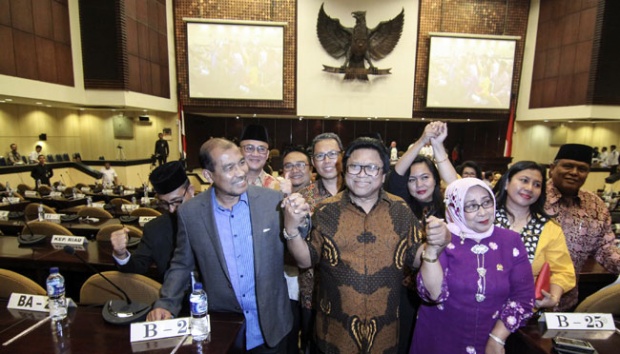The Tricks of our 'Senators'
Translator
Editor
Kamis, 1 Januari 1970 07:00 WIB

TEMPO.CO, Jakarta - The election of Oesman Sapta Odang as speaker of the Regional Representatives Council (DPD) seems like a sign of the institution's ruin. The businessman from West Kalimantan was elected through an improper mechanism. Oesman's position as chairman of the People's Conscience (Hanura) Party will mean the DPD becomes a representative of political partiesand no longer a representative of the regions in line with the constitutional mandate.
The Supreme Court should not have sworn in Oesman because he was elected through a process which contradicted its own ruling. The presence of Supreme Court Deputy Chief Justice Suwardi, who presided over the inauguration of the DPD leadership last week, was an insult to his own institution. The Supreme Court abrogated DPD Regulation No. 1/2016 and DPD Regulation No. 2, which were the basis for the election.
These two regulations, which reduced the term of office of the DPD leadership, were ruled as being at odds with the Law on the Organization and Composition of the People's Consultative Assembly (MPR), House of Representatives (DPR), DPD and Regional Legislative Councils (DPRD). Through the abrogation of this ruling, the term of the DPD leadership remains five years, not two and a half years, as stated in the new regulations. This means that the 'senators' should not have elected a new leader, given that the current leadership term does not expire until 2019.
The reason given by a Supreme Court official, that the DPD process was in line with the reexamination ruling, is an insult to common sense. The DPD has corrected the term of office regulation so that it is the same length as the term of the members, but the change though DPD Regulation No. 3/2017 was made before the inauguration. If they really had abided by the Supreme Court ruling, the 'senators' supporting Oesman would not have organized the election.
The contrived election of the leadership has sparked an intense conflict within the DPD. It is not right that the leadership term of office be suddenly changed to two and a half years simply because of political ambition. And the practice to date makes it perfectly clear that the term of office is five years, like those of other legislative bodies, the DPR and the MPR.
These political guerrilla tactics undermine the role of the DPD as a body to channel the aspirations of the regions. The fact that Oesman is also chairman of the Hanura Party will tend to turn the DPD into a representative of the parties. The DPD's position will only worsen if the members who supported Oesman for the leadership flock to join the Hanura Party.
The decline of the DPD began with the passing of Law No. 10/2008 on Elections, which ended the ban on party members and managers standing for the DPD. This policy, which was subsequently confirmed by the Constitutional Court, opened the way for party members to join the DPD.
Although it will be difficult, there must be an endeavor to save the DPD. This could start with those 'senators' who lost out as a result of the political maneuvering by Oesman and his associates. They could still petition the State Administrative Court for a ruling on the validity of Oesman's leadership. The former leadership is in a strong position because they were clearly elected and inaugurated in a plenary session for the 2014-2019 term.
President Joko Widodo and the DPR should also step in and return the DPD to its position as decreed by the Constitution. This could happen with a revision to the Law on the Organization and Composition of the MPR, DPR, DPD and DPRD, and to the Elections Law. There must be a clear rule that party managers cannot be members, let alone leaders, of the DPD. Our system of government will collapse if the parties are able to use the DPD for their own purposes. (*)
Read the full story in this week's edition of Tempo English Magazine




















